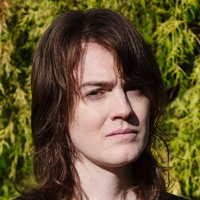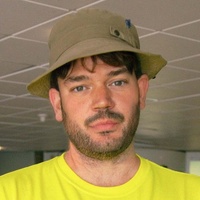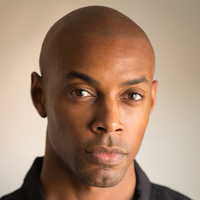As told to J Bennett, 2908 words.
Tags: Music, Art, Philosophy, Process, Inspiration, Identity.
On creating in a unique way
Musician (Liturgy) and sculptor Haela Ravenna Hunt-Hendrix discusses interdisciplinary work, navigating religion through art, and inspiring others.Let’s talk about your creative process. When you write songs for Liturgy, does it start the same way every time, or does that vary from song to song?
It kind of varies. I’ve been making demos of music for years and years, and I save all of them. So, I still have sketches that are either on guitar, or on the organ setting on a keyboard, or maybe they’re beats that I made, or different programming stuff. Or sometimes I just notate stuff directly in music notation software. It’s just improvising, and making sketches, and saving them. When I’m starting to think about writing a full song, I usually go through those and rediscover what I did or find connections between one sketch and a different sketch, or maybe translate something from keyboard to guitar, or from guitar to keyboard, or a drum part, or something like that.
It’s a very non-linear process. I’m never writing just one song at a time—it’s usually a whole album. I’m usually not sure what the final form of any of the songs are going to be until very late in the process, which is why in Liturgy albums, the songs usually share a lot of material with each other—they’re all written at the same time. I really enjoy taking themes or motifs that I’ve been working with and then slowing them down, or putting them on a different instrument, or playing them backwards, or something like that—just performing these operations and then reinserting the piece somewhere else.
When you’re playing something backwards, for example, is that a writing technique or an experiment?
It’s an experiment. 19th century composers did that kind of thing a lot, and I always really enjoy finding those puzzles in classical compositions. One example in Liturgy is the song “Generation” on Aesthethica. It’s actually the same riff as a good portion of the song “Veins of God” on Aesthethica, but the “Veins of God” version is way slower. And you might never realize that for years. Maybe if you learn how to play both songs or you just have some insight, you’d be like, “Oh my god, that’s actually the same riff.” And there’s a lot of that stuff on the new album. To me, that’s part of what music is—those kinds of constructions and variations.
Do you view that stuff as a reprise, in a way?
Yeah, a reprise or a variation. It’s part of sonata form, which is a particular tool in 19th century classical music where you take your materials, and then at a certain point in the piece, you try to combine them in unusual ways. I feel like it maybe builds tension, or it makes you think, or it gives a sense of wholeness—something like that.
Do you start with a certain feeling or atmosphere that you’re going for, or are you just sitting down with your instrument to see what comes out?
I think it’s a little bit different at different times. I think that there is a pretty consistent yearning feeling that’s always there in Liturgy. I remember when I started making music that was distinctively just for Liturgy, it was always me playing tremolo guitar, but playing through a distortion pedal into headphones in my dorm room in college. I was playing really, really high up on the neck, and focusing on these dissonant but beautiful dyads. All Liturgy songs used to sound like that, but over time, I developed more starting points.
Sometimes I don’t even feel like writing music, but I’ll make myself do it, and so I’m not feeling anything at all. But yeah, there’s definitely a focus on yearning—and constantly growing and expanding, which, to me, is just what music is all about. There’s a lot of music made that’s not about that, but that’s what I’m always going for.
Do you typically discard a lot of material when you’re writing?
I do, but I tend to end up using it somewhere else. Anything that I like, I try to make use of. And a lot of times, Liturgy songs will have maybe one short bridge section or something that was originally an entire song. Or there’s a riff that happens one time that originally repeated for a whole song. I try to pack in as much as I can. And anything I don’t use on one album, I keep track of so I can maybe use it on the next album. So, a lot of material on even the newest album is very old. It’s not like I start from scratch every time. There is this constancy.
Years ago, I spoke with a musician who wrote something like 450 songs in a four or five-year period in the ’70s, and hasn’t really written any songs since. But he’s still putting out records based on that trove of material, which I thought was fascinating.
That’s really cool. There’re definitely certain periods in your life when you’ve just got to get it out. I’ve had the experience of just bursting with this frenzied passion to create something, or break ground, or whatever, but it doesn’t last forever. You go through that phase and then maybe you’re done.
If you’re not feeling the creative spark on a particular day, do you try to write something anyway just to see what will come out? Or are you comfortable with the ebb and flow of, “Today is a good day to do this / Today is not a good day to do this”?
It depends. If I’m working on an album with a deadline, then I’m very disciplined in making myself work. And I’m always not enjoying it, in a way. I think I’m by default quite lazy, so I set a timer on my phone. It’s like, “Alright, two hours and then I can stop,” or things like that. I’m always forcing it. I’m on a laptop so much. It doesn’t sound like it, but I’m on a laptop so much writing music, and I don’t really like looking at the screen. But in a time like right now, [where I’ve got a new album coming out], I’m not writing music at all.
Playing with the band is a little different. We’re disciplined. We pretty much always practice once a week, at least, to keep things going. But that’s always really fun. I enjoy working on the music in a group, I enjoy that more than writing the music on my own. But in some ways, I do enjoy writing music on my own. I don’t know. There’s a mix, I guess.
What do you see as the pros and cons of working alone versus in a group setting?
Well, the nice thing about this band is that my bandmates read music, so I can pretty much write stuff out. And the music is so hard to play that I think they get a lot of satisfaction out of just playing it. But there’s still a lot of work to do. With some kinds of bands, it takes just a day to learn a song. With Liturgy, it takes months. And there are changes that get made as we’re involved in that process. But I am pretty serious about the creative control stuff, so the changes are fairly minimal.
The bio that went out with the new Liturgy record says that the band is “part of a shared discipline of composition, art, and philosophy that thrives on exploring the spaces in between.” Can you break that down a little bit?
I’ve been compelled to read and write philosophy for my whole life in a similar way that I’ve been compelled to listen to and write music. So, in some ways, the philosophy is a creative practice in its own right. But philosophy is not quite as creative, or it’s not as purely creative, because there’s this intellectual component to it that is supposed to, in some sense, be connected to truth, or connected to how to live life, that’s supposed to have some sort of objective meaning. So that’s different.
But I think that my philosophical work is still pretty unique to me, and I’m very interested in using philosophical concepts to come up with musical techniques, or inventions, or to write philosophy that is inspired by the feeling that comes from Liturgy’s music. My art practice has developed more slowly and more recently, but it’s similarly maximalist. I’m always very interested in combining as many different cultural references as possible in a religious context that also has elements of critique that’s connected to traditionalist culture, but is also making use of found materials, or discarded things, or trash—or whatever.
I think of music, philosophy, and drama as three dimensions of the soul connected to will, intellect, and imagination. But I imagine the work all cohering as a total thing that’s got this musical aspect, and this classic arts aspect, and this conceptual aspect. There’s actually a film for [Liturgy’s 2020 album] Origin of the Alimonies, which we play to live, but I haven’t really put online yet. More and more, I focus on those other practices, and I like to think of it as all integrated.
Is there a particular philosopher or school of philosophy that you find an affinity with in the context of Liturgy?
Right now, I’m studying Russian Orthodox theology. There are a few Russian Orthodox theologians who were working in the late 19th century and early 20th century who were basically combining Christianity with Marxism in a really unusual way. And I’m very inspired by that tradition. It’s not very well known, but it’s called Sophiology. And more generally, I’ve studied a lot of Christian theology, a lot of materialist continental philosophy, like the work of Nietzsche and Deleuze and German idealism like Hegel and Schelling, and certain artists that are very philosophical, like William Blake or Richard Wagner. And I would include Genesis P-Orridge in that as well, and Sun Ra. Those are more contemporary musical figures who have a philosophical value.
You’re a practicing Christian, and you’ve mentioned the presence of religion in your work. Has Christianity always had a presence in Liturgy?
Yeah, it was always there. My Christianity is a little bit art damaged, though. It’s not pure Christianity. And I find it perplexing that so much of what passes for Christianity and the culture is hateful—especially hateful towards queer people. I’m a queer person, so I can’t fully be a Christian in that sense. But the message of Christ, I think, is that you should love queer people or people who are marginalized. That’s 80% of what he talks about in the Bible. So, I appreciate the spirit of Christianity insofar as it relates to that message. And I really do care about the sacraments, and I find the aesthetics to be really wonderful.
You’ve said that you like to bring different influences together in ways that are uncomfortable, but that also work in unlikely ways. What do you think draws you to the uncomfortable?
That’s a good question. I guess that the uncomfortable is something that I’ve experienced a lot in my life. It’s a default. I’ve never felt like I fit in very well in social environments or in really any kind of environment. It’s always felt like something wasn’t working. That’s maybe especially extreme for me for whatever reason, but I think it’s also just part of the human condition, the human experience. It’s like something isn’t working, but if you face that squarely rather than avoiding it, then you can turn that problem into something beautiful. You can have an inventive approach, and maybe surprise yourself with a solution that’s original and is maybe even meaningful to others, or useful to others.
I’ve experienced that in all different kinds of situations in life, not just creative ones—interpersonal ones and existential ones, too. There’s just something about the messiness of things, the disastrous way that things are organized. Maybe “disastrous” is a strong way of putting it, but also not. There really are real problems. So, it’s a matter of healing a wound in a number of different senses.
Many artists who have substantial bodies of work or have been doing something for many years can look back at different points in their career and maybe not relate to their past work or maybe even sometimes the person they were when they made it. Do you ever look back at your old stuff and think, “I wouldn’t do that now,” or “I would do it differently,” or even, “What was I thinking?”
Not really. I think the older my music is, the more I identify with it. If anything, I find it really refreshing to listen to the oldest Liturgy songs, or even to the screamo band that I was in before Liturgy, Birthday Boyz. That actually reminds me of who I am. Sometimes I’ll just be like, “Oh man, I’ve gotten soft,” or “I forgot who I was” because I was just so intensely inspired when I was between the ages of about 20 and 26. I was just on fire with this very specific inspiration. And I’m still pretty inspired, but I also find it inspiring to go back and remember how I was feeling back then.
Tell me about your sculpture practice. Did it evolve as a way to express yourself outside of music?
I’ve always had somewhat of an urge to create visual art. I drew a lot as a little kid, and I encountered contemporary fine art when I was in college. I met practicing artists, people in the art scene who would go to art openings. And I took some art classes and became very inspired by Fluxus. It was the New York school of avant-garde music, figures like John Cage, and the connection between that and artists like Robert Rauschenberg or Joseph Beuys. I saw that in mid-century there had been this thriving and lively connection between music and art. But Beuys, especially, was an influence on me in terms of using found materials to create religious relics, basically—or to use sculpture to put people in touch with their own creative abilities, and just really to be sensitive to the creative capacity in every human being and the creative forces that are just flowing through society, whether they’re economic, sexual, or spiritual, and just trying to designate them or allow them to flow through me.
Sculpture has a long history of artists using discarded or reclaimed materials, but why do you personally like incorporating things into your work that are—as you’ve said in the past—other people’s trash?
Usually, when I reclaim it, I spray paint it gold. And to me, it’s turning something that was discarded into something that is sacred or really valuable, and making it feel like it really matters—turning it into an icon or something. I like the idea that anything, maybe, can become an icon. I also like drawing attention to the biography of whatever it is. It’s thinking about how it might have been used by the person who originally owned it, or what function it was supposed to play in the industrial process, and just taking it out of that—taking it out of these arenas where something had been useful, or merely useful, and bringing out its aesthetic qualities. And some of the so-called reclaimed materials are actually belongings of my own that broke, or that I couldn’t use any longer, or they belonged to people close to me. And so that brings to mind memories of my own or of those people.
There was an exhibition of your work at Gern en Regalia in New York this past summer. You wrote an introduction for it, which you concluded by saying, “When Christ returns, the art world will fall away, and finally, art will be our sole concern.” What inspired that?
I like to think that not just the art world, but the music industry, too—that these are arenas where we’re doing our best to create authentically, but what we make still has this function in culture that isn’t always aligned with true creative authenticity. If you imagined heaven—I like imagining heaven; the new album is sort of about heaven—that would be a world where artists really have the opportunity to devote themselves to create a self-realization. I realize not everybody necessarily values that so much, at least on the surface. But I find—and I know there’s plenty of other people like me—that there’s just this really, really deep satisfaction that comes from creating in a unique way. There’s nothing more sacred than that, and sharing what you’ve created with others in a way that inspires them to do the same in their own unique way. That sounds like heaven to me. The logistics of how to create that world that are beyond me, but I think that’s a valuable goal.
Ravenna Hunt-Hendrix Recommends:
St. Francis of Assisi (opera)
Meditations on the Tarot: A Journey into Christian Hermeticism (book)
Unfading Light: Contemplations and Speculations by Sergius Bulgakov (book)




